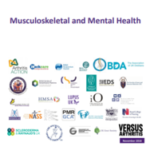 Tracey Loftis, Head of Policy and Public Affairs Versus Arthritis, attended the Lords Economic Affairs Committee on Tuesday 4 December 2018 to talk about social care and the needs of people with arthritis, alongside colleagues from Mencap and the Alzheimer’s Society.
Tracey Loftis, Head of Policy and Public Affairs Versus Arthritis, attended the Lords Economic Affairs Committee on Tuesday 4 December 2018 to talk about social care and the needs of people with arthritis, alongside colleagues from Mencap and the Alzheimer’s Society.
In a wide-ranging session, Tracey highlighted Versus Arthritis’ research on aids and adaptations, the positive impact they have on the lives of people with arthritis and the challenges people still experience when trying to access them. Members of the Committee were particularly struck by the numbers of people affected by musculoskeletal conditions and the massive impact arthritis has on their lives. …
Read more of this article




 Guest blog by Suzanne Rastrick, Chief Allied Health Professions Officer, NHS England
Guest blog by Suzanne Rastrick, Chief Allied Health Professions Officer, NHS England
 The Work Foundation’s Health at Work Policy Unit has published its latest report:
The Work Foundation’s Health at Work Policy Unit has published its latest report: 


 by Dr Hamish Reid, Consultant in Sport and Exercise Medicine, Moving Medicine design and development lead
by Dr Hamish Reid, Consultant in Sport and Exercise Medicine, Moving Medicine design and development lead
 Prevention is in the news this week as Health and Social Care Secretary Matt Hancock announced that prevention must be at the heart of the NHS long-term plan, with more spending on community services.
Prevention is in the news this week as Health and Social Care Secretary Matt Hancock announced that prevention must be at the heart of the NHS long-term plan, with more spending on community services.
 There seems to have been a lot of mental health in my work in recent weeks. I’m pleased for two reasons. Personally, as someone who used to work for Mind it’s a subject that remains dear to my heart. But also, because this increase in mental health related activity is a sign that the mental health sector is focusing increasingly on the needs of people with long-term conditions. At the moment that’s focusing much more on conditions like diabetes or cardiovascular disease.…
There seems to have been a lot of mental health in my work in recent weeks. I’m pleased for two reasons. Personally, as someone who used to work for Mind it’s a subject that remains dear to my heart. But also, because this increase in mental health related activity is a sign that the mental health sector is focusing increasingly on the needs of people with long-term conditions. At the moment that’s focusing much more on conditions like diabetes or cardiovascular disease.… 
 Over the last few months ARMA has been working with members on a new strategy, setting out more clearly what we work on and how we work in collaboration with our members. We will work in those areas where collaboration will have bigger impact than any single organization working alone. Through greater clarity and focus we expect to achieve greater impact. If you are reading this and thinking that your professional body or patient organisation isn’t a member but really should be part of this, encourage them to join.…
Over the last few months ARMA has been working with members on a new strategy, setting out more clearly what we work on and how we work in collaboration with our members. We will work in those areas where collaboration will have bigger impact than any single organization working alone. Through greater clarity and focus we expect to achieve greater impact. If you are reading this and thinking that your professional body or patient organisation isn’t a member but really should be part of this, encourage them to join.… 
